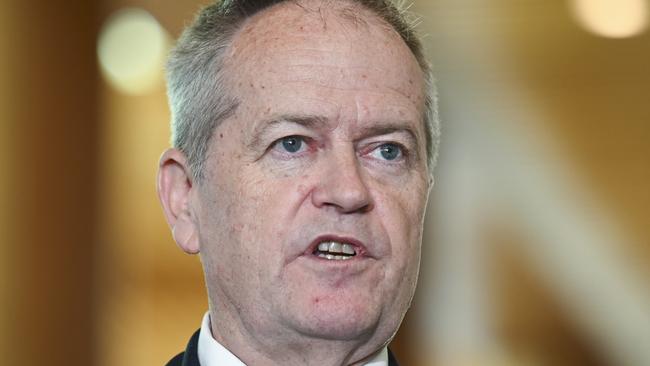NDIS reform pushed ahead by states deal
Bill Shorten has handed over significant powers to states and territories in the design of NDIS reforms hoped to help save the federal budget $14bn across the next four years, as part of a breakthrough agreement.

You can now listen to The Australian's articles. Give us your feedback.
Bill Shorten has handed over significant powers to states and territories in the design of NDIS reforms hoped to help save the federal budget $14bn across the next four years, as part of a breakthrough agreement that ensures their support for the first tranche of reforms set to pass parliament.
Tasmanian Premier Jeremy Rockliff, who visited the NDIS Minister with South Australian Premier Peter Malinauskas earlier this month, said the deal included “a number of significant changes” agreed to by Mr Shorten as well as a “range of concessions from the states and territories”.
Mr Shorten said the bill – which limits the services that can be claimed by NDIS participants – would provide the “scaffolding” for the broader changes to the scheme to be negotiated between the federal government and states by July 1 next year.
The broader disability reform package, to be discussed at national cabinet in December, is aimed at limiting the growth of the NDIS to 8 per cent a year, with tighter funding rules to be complemented with new “foundational support” programs catering for disabled people with less complex needs.
While the NDIS reforms are aimed at lowering the growth in the number of people who join the scheme, it is unknown whether there will be a tightening of eligibility or whether this will be achieved through the new laws that limit what can be claimed.
The Australian understands the Albanese government is yet to begin funding negotiations on the NDIS reforms, less than a year from the scheduled rollout of a new system.
A West Australian government spokeswoman said “significant work is still to be done” to improve the operation of the NDIS.
“These changes are an important recognition that states and territories jointly fund and govern the NDIS,” the spokeswoman said. “This was a positive step in addressing our concerns, however significant work is still to be done.”
When asked when states would receive modelling on relevant costings and when the negotiations over lifting of their annual contribution to the NDIS would begin, Mr Shorten responded: “Not today.”
After admitting earlier this month that the states did not support the NDIS legislation, Mr Shorten on Wednesday said he had made “significant changes” to win over the premiers, including ensuring they had final sign-off on the list of services allowed under the scheme.
He said the states’ support for the legislation would “protect” last year’s national cabinet agreement to set an 8 per cent yearly growth target, down from the current rate of annual growth of about 15 per cent.
“These are the first and most significant co-governance changes since the inception of the scheme a decade ago,” Mr Shorten said. “There has been an agreement to introduce faster timeframes for approving NDIS rules, a new dispute resolution approach to escalate issues to first ministers and a move from unanimous to majority first minister support for any rules with any significant impacts for people with disability and governments.”
Labor’s legislation will give governments the ability to design a “new needs assessment” tool, thereby improving the process of how people get on to the NDIS in the first place.
Automatic top-ups to plans will be put to a stop, with Mr Shorten blaming the practice on dodgy operators encouraging participants to spend their money prematurely and then apply for more funding.
While Mr Shorten said the Coalition had told him they saw the progress with the states as “constructive”, opposition NDIS spokesman Michael Sukkar said his party was “still considering” Labor’s amendment but already had concerns about next steps.
“If the bill passes Bill Shorten will have the tools that he’s asked for to deliver – and we have severe concerns about his ability to deliver on his pre-election promises,” Mr Sukkar said.
“Parents are concerned about the lack of progress on foundational supports and it still seems nothing has been done on foundational supports, and no doubt the states remain in the dark.”
Permanent rules over which supports were eligible and ineligible for NDIS funding would be developed with states to replace the “transitional rules” that would come into force within a month of Labor’s legislation passing.
A draft list of rules is being consulted on, with items such as dishwashers, cigarettes, musical instruments, sex toys, trampolines and services such as sex work, crystal therapy and yoga listed as “not NDIS supports”.
However, Mr Shorten said he “apologised” for the listing of menstrual products under “lifestyle items”, and that period products designed for people with disability still would be able to be purchased with NDIS funding.






To join the conversation, please log in. Don't have an account? Register
Join the conversation, you are commenting as Logout